
The meadow brown is a butterfly found in the Palearctic realm. Its range includes Europe south of 62°N, Russia eastwards to the Urals, Asia Minor, Iraq, Iran, North Africa and the Canary Islands. The larvae feed on grasses.

The silver-washed fritillary is a common and variable butterfly found over much of the Palearctic realm – Algeria, Europe and across the Palearctic to Japan.

Apatura ilia, the lesser purple emperor, is a species of butterfly native to most of Europe and east across the Palearctic. It is named for its similarity to the purple emperor butterfly.

Erebia epistygne, the spring ringlet, is a species of butterfly in the family Nymphalidae. It is found in France and Spain. Its natural habitat is temperate grassland.
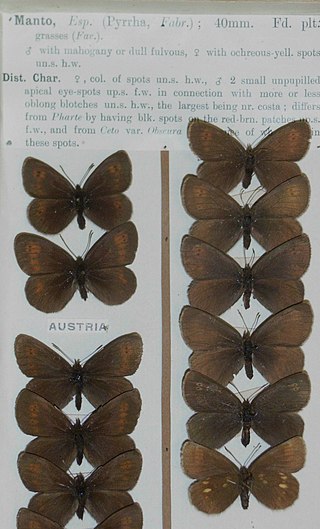
The yellow-spotted ringlet is a member of the subfamily Satyrinae of the family Nymphalidae. It is associated with (sub)alpine meadows at 900–2,500 m above sea level. It is found in the Alps, the Pyrenees, the Cantabrian Mountains, the Massif Central, the Vosges Mountains, the Carpathian Mountains and the mountains of Herzegovina.

The autumn ringlet is a member of the Satyridae subfamily of the family Nymphalidae. It is a high-mountain butterfly found in the Pyrenees, Alps and in Italy.
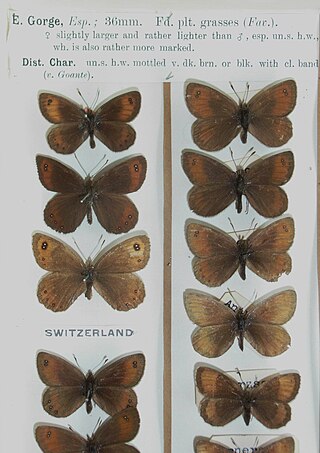
The silky ringlet is a member of the subfamily Satyrinae of the family Nymphalidae. It is a high-altitude butterfly found on screes in the Alps, Pyrenees, central Italy and the Balkans. It is a very variable butterfly.

The marbled ringlet is a member of the subfamily Satyrinae of the family Nymphalidae.

The de Prunner's ringlet is a member of the subfamily Satyrinae of the family Nymphalidae.

The Styrian ringlet is a member of the subfamily Satyrinae of the family Nymphalidae. It is a mountain butterfly found in the Austrian and Italian Alps, Croatia and Slovenia.

The black ringlet is a member of the subfamily Satyrinae of the family Nymphalidae. It is a high-altitude butterfly found in Albania, former Yugoslavia, Bulgaria, Greece, and Romania.
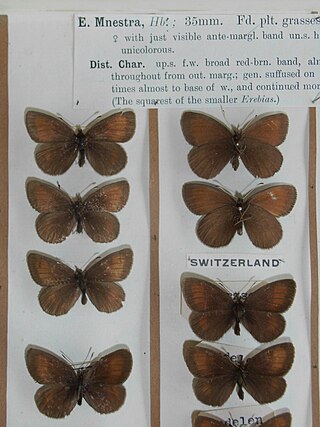
Mnestra's ringlet is a member of the subfamily Satyrinae of the family Nymphalidae. It is a mountain butterfly found in the Alps of Austria, France, Italy and Switzerland. The Mnestra's ringlet is named for Mnestra, a daughter of Erysichthon, king of Thessaly in Greek mythology.

The water ringlet is a member of the subfamily Satyrinae of family Nymphalidae. It is a high altitude butterfly found in the Alps, Bavaria, Styria, Pyrenees, Carpathians and Bulgaria.

Erebia pandrose, the dewy ringlet, is a member of the subfamily Satyrinae of the family Nymphalidae. It is found from the Arctic areas of northern Europe, the Pyrenees, Alps, the Apennine Mountains, the Carpathian Mountains, Kola Peninsula and Kanin Peninsula, part of the Ural and the Altai and Sayan Mountains up to Mongolia.
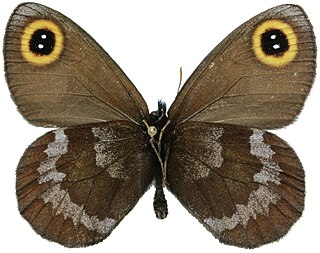
Erebia cyclopius is a species of butterfly of the subfamily Satyrinae in the family Nymphalidae. It is found through Siberia, northern Mongolia, northern China and North Korea. The habitat consists of forest edges, flowery meadows and sparse larch forests.

Arethusana is a butterfly genus from the subfamily Satyrinae of the brush-footed butterfly family (Nymphalidae). It is composed of only one species, Arethusana arethusa, the false grayling.

Boeberia is a genus of satyrine butterflies containing a single species Boeberia parmenio found in the Altai mountains South Siberia, Mongolia, Yakutia, Amur and North east China.

Erebia discoidalis, the red-disked alpine, is a member of the subfamily Satyrinae of family Nymphalidae. It is found in North America from eastern Quebec, through northern Ontario, and the northern Prairies to northern British Columbia, the Northwest Territories, Yukon, and Alaska. It reaches just into the northern U.S. between Michigan and Montana, and also occurs in Asia, where it has been recorded from the Chukot Peninsula to the eastern Sayan Mountains and Amur. The habitat consists of large, open, grassy bogs and other areas with acidic soils.
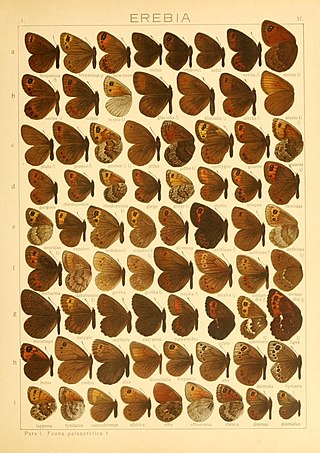
Erebia dabanensis is a small butterfly found in the East Palearctic that belongs to the browns family.
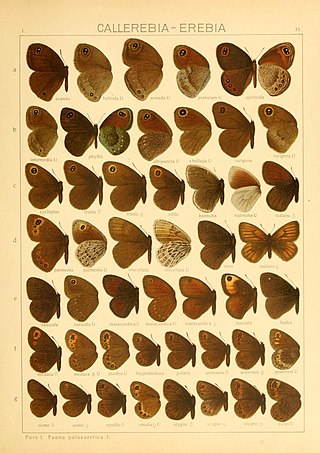
Erebia edda is a small butterfly found in the East Palearctic that belongs to the browns family.




















